New Dean Named to Johnson & Wales University College of Culinary Arts
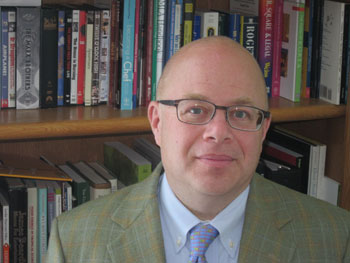 Peter Lehmuller, Ed.D., has been appointed dean of the College of Culinary Arts at Johnson & Wales University (effective July 1, 2013). He was most recently the dean of Academic Affairs at the university’s Charlotte campus and has relocated to the university’s flagship campus in Providence, R.I.
Peter Lehmuller, Ed.D., has been appointed dean of the College of Culinary Arts at Johnson & Wales University (effective July 1, 2013). He was most recently the dean of Academic Affairs at the university’s Charlotte campus and has relocated to the university’s flagship campus in Providence, R.I.
Lehmuller assumes his new position at a time when culinary-arts education is undergoing a profound assessment by both its peers and critics. The field is increasing in scope, requiring both experiential education and a more extensive college education to succeed. JWU is at the forefront of this turning point as it advances its academic programs to reflect the trends and demands of the industry.
During the past three decades, JWU’s culinary academic programs have evolved from an associate-degree program to include bachelor-of-science degrees in Culinary Nutrition, Culinary Arts and Foodservice Management. Currently, JWU culinary faculty and administration are developing a new curriculum expected to deepen a student’s knowledge required by the foodservice industry, as well as the fields of science and health. The university is also exploring post-graduate programs that will raise the level of a graduate’s value in the workplace.
In his role as dean of the College of Culinary Arts, Lehmuller says, “This is a phenomenal time to be in the hub of culinary academics. I am looking forward to the changing direction that JWU has set to achieve in the near future. We are at a crossroads where the demands of the industry and the betterment of society require graduates to have more complex set of skills and knowledge in order to succeed.”

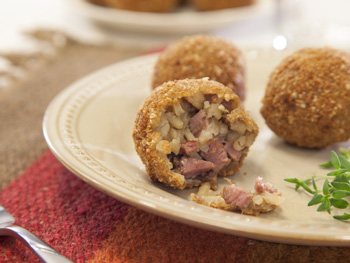 Entries in the 2013 Discover Duck Recipe Contest prove great tastes come in small packages. Sponsored by Maple Leaf Farms, the annual contest challenged professional chefs and culinary students to produce an original appetizer or small plate recipe showcasing Maple Leaf Farms duck. Nearly 250 entries from across the country were submitted, competing for more than $15,000 in cash prizes.
Entries in the 2013 Discover Duck Recipe Contest prove great tastes come in small packages. Sponsored by Maple Leaf Farms, the annual contest challenged professional chefs and culinary students to produce an original appetizer or small plate recipe showcasing Maple Leaf Farms duck. Nearly 250 entries from across the country were submitted, competing for more than $15,000 in cash prizes.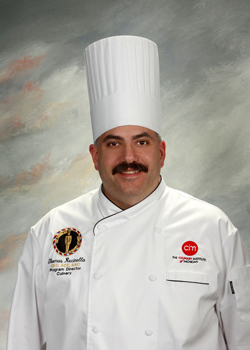 Thomas Recinella, CEC, ACE, AAC, program director for Baker College of Port Huron’s Culinary Institute of Michigan, has been inducted into membership of the prestigious Disciples Escoffier International-USA.
Thomas Recinella, CEC, ACE, AAC, program director for Baker College of Port Huron’s Culinary Institute of Michigan, has been inducted into membership of the prestigious Disciples Escoffier International-USA. 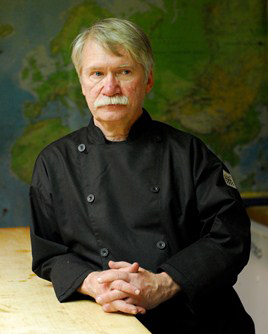 As high-school seniors yearn to become star chefs, more colleges consider the leap to culinary education. The result is a glut of programs all vying to meet enrollment goals. Meanwhile, the cost of a quality culinary education far exceeds earning potential.
As high-school seniors yearn to become star chefs, more colleges consider the leap to culinary education. The result is a glut of programs all vying to meet enrollment goals. Meanwhile, the cost of a quality culinary education far exceeds earning potential.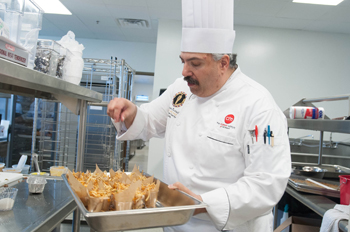 New 23,000-sq.-ft. facility—part of a $24 million area project—focuses on European-style cooking, with veteran chef and educator Tom Recinella at the helm.
New 23,000-sq.-ft. facility—part of a $24 million area project—focuses on European-style cooking, with veteran chef and educator Tom Recinella at the helm.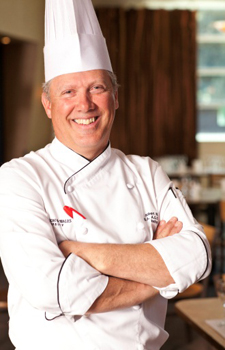 Braised lamb is economical and efficient. A successful lamb braise intermingles the flavors of foods being cooked, the aromatics employed and the cooking liquid—performing a magical transformation of lamb while adding body to the braising-liquid-turned-sexy-sauce.
Braised lamb is economical and efficient. A successful lamb braise intermingles the flavors of foods being cooked, the aromatics employed and the cooking liquid—performing a magical transformation of lamb while adding body to the braising-liquid-turned-sexy-sauce.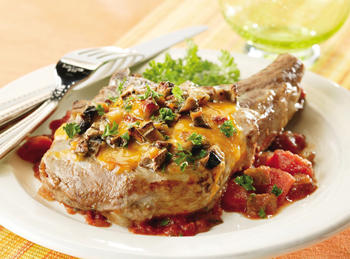 A new foodservice study shows that among all pork categories, bacon consumption grew the most per pound between 2011 and 2013, while carnitas meat grew fastest by percentage.
A new foodservice study shows that among all pork categories, bacon consumption grew the most per pound between 2011 and 2013, while carnitas meat grew fastest by percentage. Alex Stupak returns to his alma mater to deliver a commencement address, citing Grant Achatz and Ken Oringer as role models.
Alex Stupak returns to his alma mater to deliver a commencement address, citing Grant Achatz and Ken Oringer as role models.